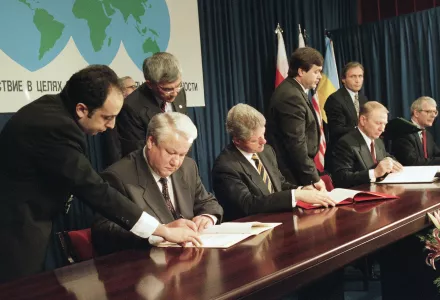
At first, it might seem surprising that Ukraine, a country on the fringes of Europe, is suddenly at the turbulent center of American politics and foreign policy. With an impeachment inquiry in Washington adding further detail to the story of the Trump administration’s efforts to tie U.S. security assistance for the country to Ukrainian cooperation in investigating President Donald Trump’s Democratic opponents, Trump’s presidency itself hangs in the balance. And the repercussions go even further, raising questions about the legitimacy and sustainability of U.S. power itself.
In fact, that Ukraine is at the center of this storm should not be surprising at all. Over the past quarter century, nearly all major efforts at establishing a durable post–Cold War order on the Eurasian continent have foundered on the shoals of Ukraine. For it is in Ukraine that the disconnect between triumphalist end-of-history delusions and the ongoing realities of great-power competition can be seen in its starkest form.
To most American policymakers, Ukraine has represented a brave young country—one that, despite the burden of history, successfully launched itself on a path of democratic development as part of a new world order after the fall of the Berlin Wall. To the Kremlin, meanwhile, it has remained an indispensable part of a long-standing sphere of influence, one that operates largely according to old rules of power. The difference between these two views goes a long way toward explaining why post–Cold War hopes have given way to the strife and uncertainty of the world today.
U.S. and other Western policymakers have long skirted hard questions about both Ukraine’s place in the Eurasian order and its role in the fraught relationship between Washington and Moscow. Although the end of the Cold War may have marked the end of one geopolitical competition, it did not mark the end of geopolitics. Nor did the dissolution of the Soviet Union mean the disappearance of Russian anxieties, ambitions, and abilities. The Soviet Union may have ceased to exist on paper in December 1991, but its influence did not. Empires do not simply vanish. They die long and messy deaths, denying their decline when they can, conceding their dominions when they must, and launching irredentist actions wherever they sense an opening. And nowhere are the consequences of the still ongoing Soviet collapse clearer than in Ukraine—a country that has wrecked attempt after attempt at establishing a durable order on the Eurasian continent.
The story of Ukraine over the past quarter century is a story of magical thinking’s remarkable persistence and ultimate price—paid not just by Ukrainians but more and more by Americans, too.
Serhii Plokhy and M.E. Sarotte, “The Shoals of Ukraine: Where American Illusions and Great-Power Politics Collide,” Foreign Affairs, November 22, 2019.
The full text of this publication is available via Foreign Affairs.






